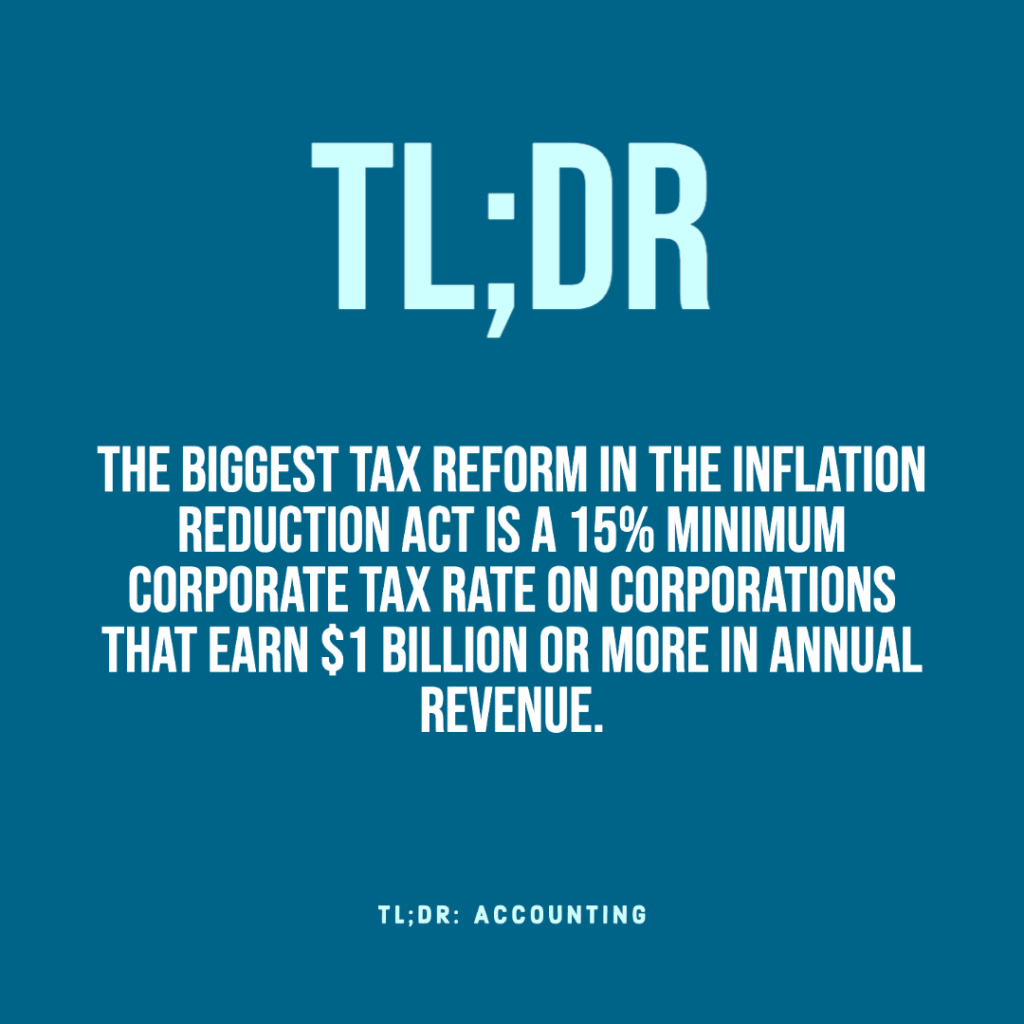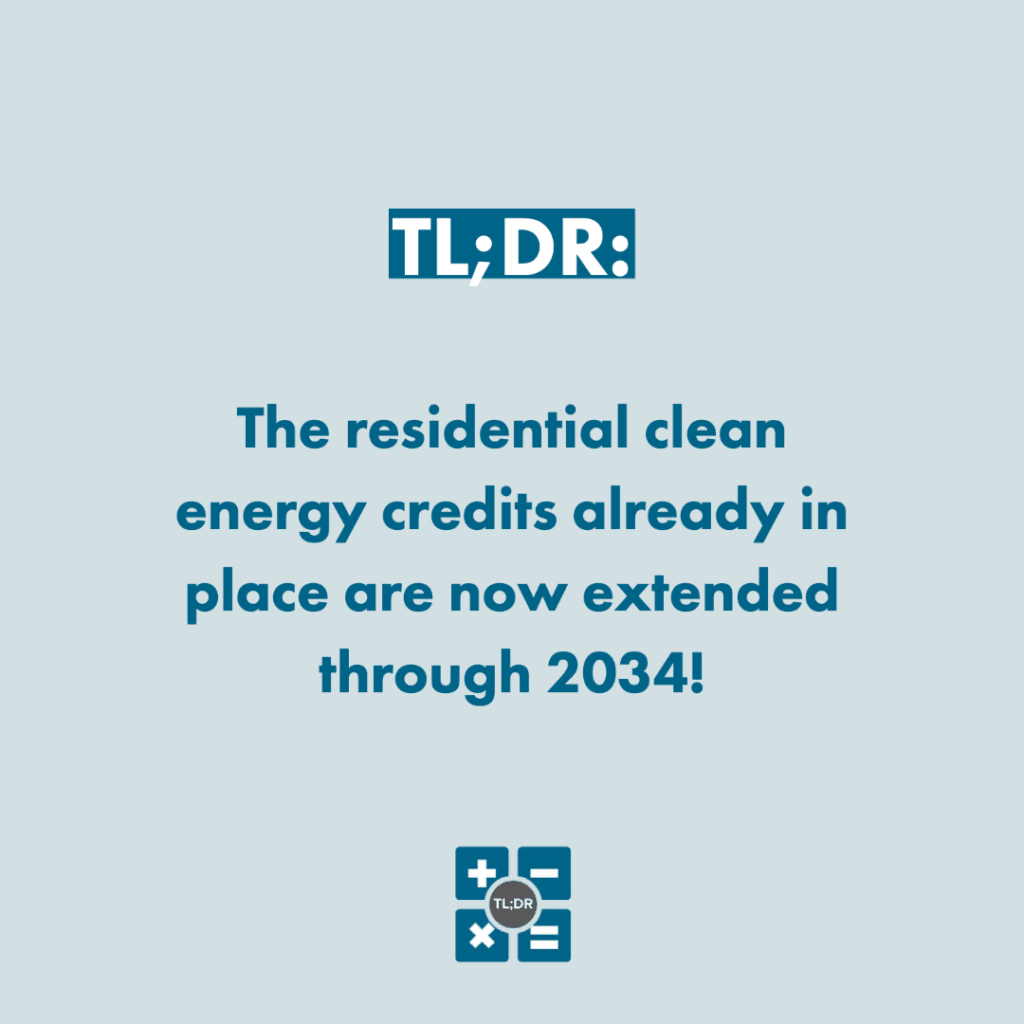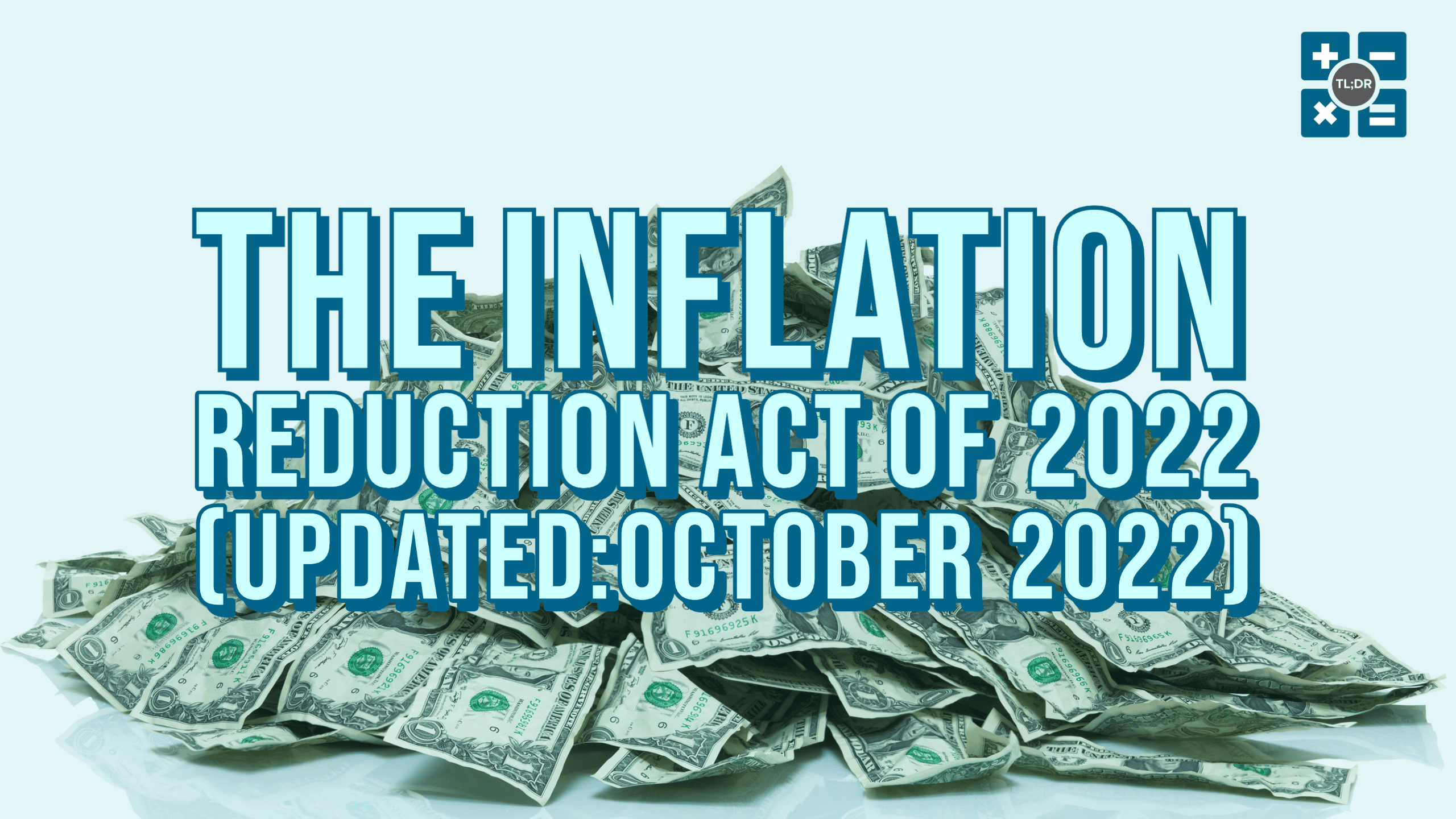Inflation has been, and continues to be, one of the biggest obstacles to a happy and stable life for Americans countrywide. In 2021, inflation was 7% according to the Bureau of Labor Statistics. This average, of course, fails to highlight that gas prices rose 49.6% in a single year, an especially unfortunate fact for many workers who must pay for gas in order to drive to their in-person jobs.
It is unclear how the Inflation Reduction Act will affect gas prices. Even with the benefit of retrospect, assessing the effects of any single piece of legislation on something as broad as inflation is extremely difficult. Each of the 8 billion people on this planet has the potential to affect inflation on a daily basis. What is clear is that this Act is probably the largest investment in domestic clean energy this country has ever seen.
There are many provisions in this Act. First we’ll cover the major ways in which the Act raises money (which will likely not affect you or your business). Next we’ll cover provisions that may affect your business’s finances, such as the provision for increased tax enforcement. We will wrap up by examining the major ways in which the revenue from this Act will be spent.
Major Revenue-Raising From Large Corporations

The biggest tax reform in the Inflation Reduction Act is a 15% minimum corporate tax rate on corporations that earn $1 billion or more in annual revenue. Note that this minimum rate does not apply to S-Corporations. And though the standard sounds relatively simple, its execution is much more complex. If you have ever filed Alternate Minimum Tax (AMT) for your 1040, you may have an understanding of how these kinds of taxes work: It’s complicated.
Another provision affecting large corporations is a new 1% excise tax on stock buybacks. In short, a stock buyback is when the management of a corporation spends corporate cash to repurchase shares of the corporation’s own stock on the open market. Generally, this is done anonymously. There is contention among politicians and economists about whether stock buybacks are bad for the economy. Executives often sell their own corporate stock shortly after a buyback at inflated prices in order to line their own pockets. This is a good reason why the federal government is now penalizing such behavior with a new excise tax.
Third, a narrow but impactful part of the legislation is a way for Medicare to negotiate the price for certain drugs to lower prices than before. Even though this only affects a small selection of drugs, the impact is expected to be so significant that this one provision will likely create the most revenue out of all items in the new law.
These provisions are targeted towards the largest multinational corporations in the world. The good news is that they most likely will not affect you personally.
Items That May Negatively Impact You or Your Business
The Inflation Reduction Act includes multiple items that will bolster the IRS’s ability to audit tax returns. What this mainly comes down to is increased funding. Over the last decade, IRS funding was cut by about 20% (adjusted for inflation). Some of the main IRS computers still run on software that was developed using the COBOL programming language, which dates back to the 1960s. They still use magnetic tape storage technology that was developed about 50 years ago. With new funding from the Inflation Reduction Act, the IRS will be able to hire tens of thousands of more employees, and may be able to modernize their operations to an extent.
This will likely lead to more IRS tax audits, which may affect your business. Contact us if you would like more information on best practices to avoid audits. If you do ever get audited, let us know and we will advise you throughout the process. We’ve got your back!The Act also extends a limitation on excess business losses through 2028. If this is something that wasn’t affecting you before, it likely won’t affect you now. In short, if your business suffers a net loss of more than $270,000 (or $540,000 if married filing jointly), some of your losses may be non-deductible. There are extra provisions regarding at-risk and passive activity limits, which are beyond the scope of this article. Check with us if you are concerned about this loss limitation provision.
Additional Funding
The Inflation Reduction Act provides for the following increases in funding (as in, these amounts are on top of the annual funding already in place):
- $3.18B for taxpayer services
- $4.75B for business system modernization
- $45.6B for enforcement
- $25.3B for operations support
- Additional Funding
- $15M for IRS free-file system
- $403M for Treasury Inspector General for Tax Admin (TIGTA)
- $104.5M for Treasury Office of Tax Policy to assist in regulations
- $153M for US Tax Court
Note that the above amounts are in place until September 30, 2031.
Let’s go into more depth about enforcement because $45.6 billion extra can sound intimidating. First, US Treasury Secretary Janet Yellen has assured us that there will be no increase in audits of Americans making less than $400,000 annually. On the contrary, she indicated that audit risk for such Americans will decrease, due to improved technology and customer service.
Yes, what you may have heard is true: The IRS is likely hiring about 87,000 more employees. Note that these will not all be armed auditors: Remember that the IRS is putting more funding into technology and customer service. Some of these agents will be able to help taxpayers with their inquiries. This is important, especially if you remember how, in recent tax seasons, the IRS phone line was so tied up that their automated service started hanging up on you instead of putting you on hold.One area of likely increased enforcement will be cryptocurrencies. Make sure to track those transactions! Another area where the IRS will likely give a closer eye is business entity considerations, so make sure that you are choosing the right entity and treating it as separate from yourself. We’re talking business checking accounts, annual shareholder meetings, and official business policy documents! If you would like any help with cryptocurrency, treating your business like a bona fide business, or anything else accounting-related, contact us!
Individual Tax Credits
The Inflation Reduction Act also adds, changes, or improves specific individual tax credits that are more likely to impact your specific tax situation.
The Premium Tax Credit
There’s good news for those of us who purchase their insurance on the Affordable Care Act health insurance marketplace! There is a refundable Premium Tax Credit (PTC) for many taxpayers that may even apply if you make over 400% of poverty income (previously, this level of income disqualified the PTC).
If you want marketplace health insurance and you are a Washington State resident, you can go to the Washington Health Plan Finder website here. It might be worth a look —- it is now easier to qualify for a PTC!
Energy Efficient Home Improvement Credit
The Energy Efficient Home Improvement Credit section of the Act extends the current home improvement credit for property “placed in service” (for your use) in 2022. It also adds these new “enhanced” provisions for tax years 2023 – 2025:

- The current (2022) credit is for 10% of an improvement up to a lifetime max of $500. The enhanced credit is 30% of cost for up to $1,200 annually!
- This enhanced credit will no longer include roofs or advanced main air circulating fans (like the 2022 credit did). On the other hand, the enhanced credit includes electrical panel upgrades and certain biomass improvements.
- There are limits for the enhanced credit:
- $600 residential energy expenditures
- $600 exterior windows and skylights
- $250 for exterior door, $500 max
- $150 home energy audits
- $2,000 biomass stoves and boilers, heat pumps and heat pump water heaters.
- Also, manufacturers must have an agreement with the Treasury Department. For property placed in service after December 2024, your manufacturer should issue you a product ID to include on your tax return.
Residential Clean Energy Credits
Why pay for electricity when you can get it for free from our friend the Sun? It takes an upfront investment, sure, but it’s a good feeling to be getting that clean solar into your home. The residential clean energy credits already in place are now extended through 2034!
Thankfully, Congress had the forethought to also include battery systems as eligible for the credit. Also: fuel cells (for primary residence only), wind, geothermal, and biomass energy are credited at the same rate of 30% of the total cost (from 2022 – 2032).
The Clean Vehicle Credit
There has been a credit for electric vehicles in place for a while, and it’s being solidified with this new law. Now there is a permanent credit for vehicles placed in service between 2022 and 2032. Note that any vehicles placed in service after August 16, 2023 must have the final stage of assembly in North America in order to qualify for the credit. Also, vehicles must be $55,000 or cheaper unless they are vans, SUVs, or pickups, which have an $80,000 limit. The credit can be transferred to the dealer if this election is made before the vehicle is purchased, though a unique VIN is required and the vehicle must be made by a qualified manufacturer.
This newly adjusted vehicle credit maxes out at $7,500 and has two components:
- $3,750 if critical mineral requirements are met (a percentage of certain minerals in the car must be sourced to the US or a country with a free trade agreement with us)
- $2,750 if battery component requirements are met (also regarding sourcing)
Income requirements for this credit are as follows: Your Modified Adjusted Gross Income (MAGI) cannot exceed $300,000 for Married Filing Jointly, $225,000 for Head of Household, or $150,000 for all other filers. There is no phaseout — you lose the full credit if you’re a single dollar over the MAGI limit for this credit.
You may be able to get credit for purchases of pre-owned vehicles that are at least 2 model years old, but only if purchased from a dealer for $25,000 or less, and only if the vehicle hasn’t been otherwise transferred since August 16, 2022. Pre-owned vehicles do not need to be subject to the sourcing requirements for critical minerals or battery components.
Clean Energy and Healthcare Subsidies
The Inflation Reduction Act will raise quite a lot of money. While much of this will go toward the reduction of our looming national debt, there will also be quite a dramatic investment in domestic clean energy. About 1.5 million jobs are projected to be created, largely in the industries of energy-efficient home improvement, solar and wind power production, and clean energy storage.
If you are interested in improving your home’s energy efficiency through a heat pump or a tankless water heater, or energy generation through rooftop solar panels, now may be the time to start planning these projects. It might feel pretty great to help the Earth and reduce the impact on your wallet in the process!
Other climate change provisions that may not affect you directly include transportation infrastructure improvements in disadvantaged communities (which might lead people to take the bus instead of their car) and credits for the industrial and transportation sectors that encourage decarbonization. The Inflation Reduction Act will also move money toward climate-smart agriculture, forest restoration, and coastal habitat preservation.
Hopefully, this monumental Act will help America step forward when it comes to fighting climate change and keeping our planet habitable for all living creatures.
TL;DR: The Inflation Reduction Act is slated to hit large multinational companies, especially pharmaceutical drug companies, pretty hard. It also includes provisions that will affect smaller businesses by enabling the IRS to conduct more audits and limiting excess business losses. Despite its name, the funding that this Act provides will mainly go toward fighting climate change. But if it were called the Earth First Act, maybe it wouldn’t have gotten as many congressional votes…






